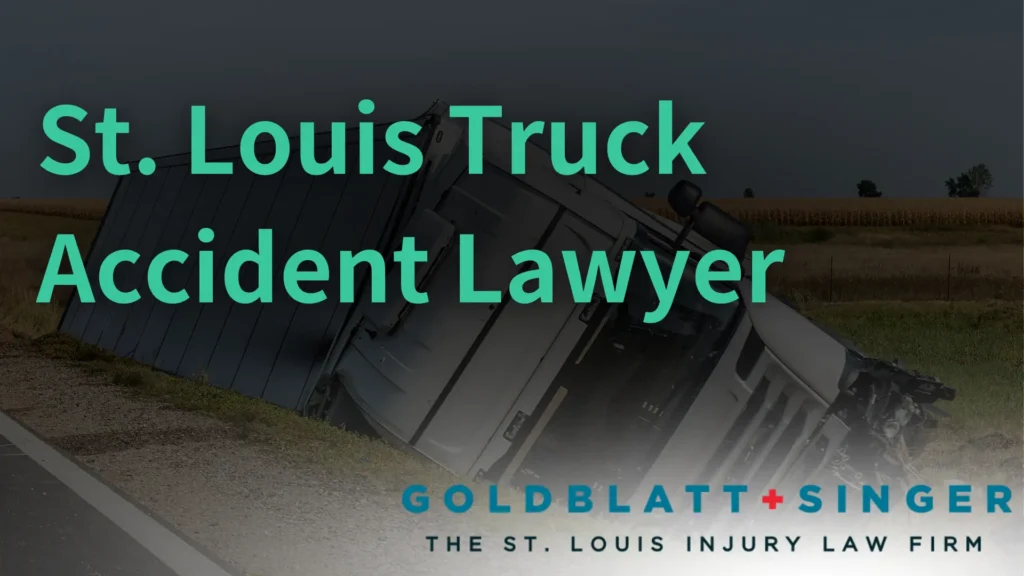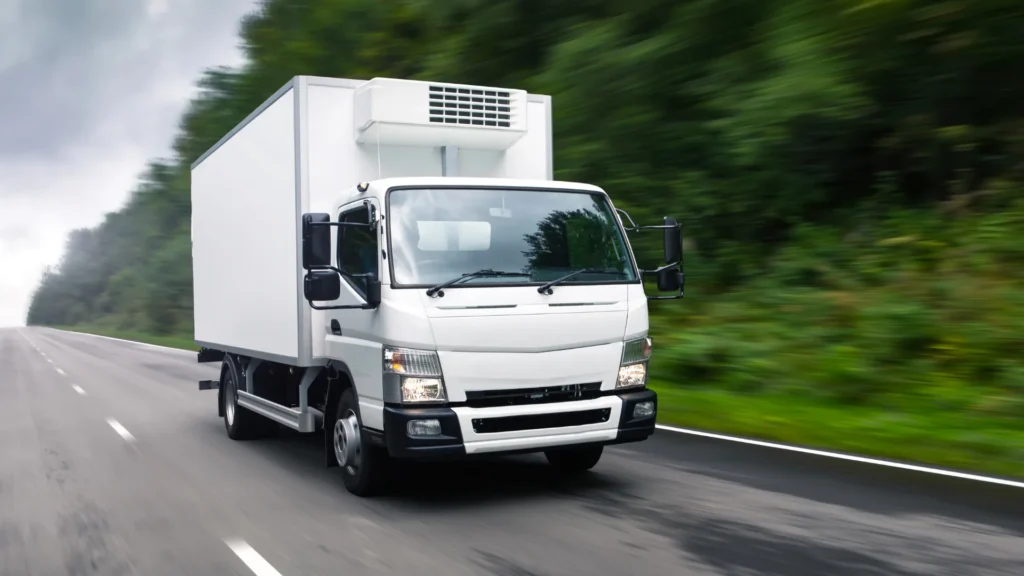
Tractor-trailers are an integral part of the American business system, carrying billions of dollars worth of goods across the country every day. However, their large size makes commercial trucks inherently more dangerous on the road than other passenger vehicles. A fully loaded tractor-trailer can weigh up to 80,000 pounds and stand 14 feet above the ground, dwarfing other vehicles. When these large vehicles cause accidents or when other drivers crash into tractor-trailers, the damage can be devastating. If you or a loved one have been seriously injured in a truck accident, call the truck accident attorneys at Goldblatt + Singer today.
Truck accident cases can become incredibly complex due to the difficulty of determining liability and the fact that you may be dealing with a life-changing injury. However, as you focus on your recovery, our St. Louis Truck Accident Lawyers can help you ensure the at-fault parties are held accountable and you receive the compensation you deserve.
There are often many parties involved in truck accident cases. In order to secure the maximum compensation, there will need to be an extensive investigation. Therefore, we will take on the responsibility of:
Once a trucking company hears of an accident, they will likely send an investigator to the scene to see how to minimize their liability. We will initiate an accident investigation immediately to preserve critical evidence of fault that can disappear quickly.
Negligence is the failure to provide a standard of care owed to another, resulting in injury or losses. To hold another party responsible for causing a truck accident, you must be able to prove the following four elements of negligence:
Proving the elements of negligence will require substantial evidence, such as the following:
Other critical evidence an attorney can help you gather to prove fault includes information on the truck’s cargo, maintenance reports, inspection records, repair records, the driver’s qualifications, permit or license information, the trucking company’s personnel records, and possibly cell phone records.
Missouri courts will apply the state law of pure comparative negligence in truck accident cases. What that means is that rather than only one party being found at fault for an accident, multiple parties can be considered responsible depending on their contribution to causing the collision. Each party involved will be assigned a percentage of fault, and their compensation will be reduced accordingly. For example, if you are awarded $100,000, and the truck driver is 100% responsible, you will receive $100,000. However, if you and the truck driver share responsibility and the truck driver is found 60% at fault, and you are 40% to blame, you will only recover 60% of your award, or $60,000.
Truck accident victims have the right to demand compensation for injuries and any other related losses. The types of damages often available in a claim include:
Any medical bills caused by the accident, as well as anticipated future costs for treatment. For example, emergency services, hospitalizations, surgeries, doctor appointments, medications, physical therapy, home modifications, adaptive medical equipment, and other medical care you require.
The wages you would have earned had you not been injured in the accident, and any benefits. Future lost income is also included and diminished earning capacity if you cannot make the same level of income as you did before the accident.
Compensation for your vehicle’s repairs or money for its actual cash value (ACV) if it is a total loss. You are also entitled to compensation for the repair or replacement of any surrounding property damage you were forced to cause in the accident or personal items damaged such as your laptop, phone, clothing, a car seat, etc.
Compensation for the physical pain you have had to endure, and any emotional distress (e.g., depression, anxiety, PTSD, etc.) or loss of quality of life caused by the truck accident and your resulting injuries.
Punitive damages may be available in cases where the defendant exhibited an extreme reckless disregard for the safety of others (e.g., drunk driving). This type of compensation is meant to punish the at-fault party and deter others from similar conduct.
Truck accident cases are different from car accidents in several ways.
A semi-truck hooked up to an empty trailer weighs around 35,000 pounds. With a loaded trailer, the maximum weight for a semi-truck in the United States is 80,000 pounds. As a result, large trucks take much longer than cars to stop or avoid an accident. When a collision does occur, the severity of property damage and injuries is often extensive. Victims often suffer catastrophic injuries along with tens of thousands or even hundreds of thousands in medical costs and tend to no longer be able to work at the same capacity as they did previously.
In many car accident cases, it is the fault of one negligent driver. In truck accident cases, fault is rarely straightforward. Collisions involving large trucks can have multiple causes, such as the truck driver’s negligence, the trucking company’s negligence, poor or improper maintenance, improperly loaded cargo, or equipment failure. As a result, truck accidents almost always require in-depth investigation.
Truck accident cases often require knowledge of federal and state laws that commercial vehicles are subject to. Additionally, multiple parties can potentially be liable, such as the truck driver, their trucking company, or a third party, which means several insurance companies can be involved. Navigating a claim against several insurers working to preserve their bottom line and shifting the blame on the other can be overwhelming.
When truck drivers work for commercial trucking companies, it often means they are covered by larger insurance policies. High policy limits mean the insurance adjusters will be more aggressive in their attempts to avoid liability and reduce your compensation.
Trucking accidents happen in many ways. One of the most common types of 18-wheeler accidents is a jackknife accident. A jackknife accident takes place when a trailer swings out to one side as the truck continues forward. This is incredibly dangerous and may crash into multiple vehicles in multiple lanes of traffic.
Another type of 18-wheeler accident is the underride. This occurs when a smaller vehicle strikes a tractor-trailer under the trailer portion of the vehicle, effectively wedging itself under the truck.
Big rigs sit higher off the ground than smaller passenger cars, and therefore have higher centers of gravity. This makes them more susceptible to rolling over and causing significant damage. An empty trailer is more vulnerable to rolling over. Sometimes even a strong wind is enough to topple an empty trailer. Rollovers are also common during sharp turns, as large semi-trucks do not have the maneuverability of smaller vehicles. Taking a turn too fast can cause the trailer to tip over and create an accident.

Trucking accidents occur for a number of reasons, including:
Trucking accidents are complex cases. There can be multiple defendants and insurance companies involved. The question of liability may also arise when a truck driver causes an accident. If the accident occurred within the scope of the driver’s work, the employer will likely bear liability for the damages. However, if the driver engaged in dangerous, illegal or intentionally reckless behaviors, liability may fall on the driver as well. In cases involving defective vehicles or parts, the responsible manufacturer may face a product liability lawsuit.
The FMCSA also regulates the trucking industry in several ways, and their hours of service requirements are the most pertinent when it comes to trucking accidents caused by driver error. Driving a big rig is a demanding job that requires consistent focus, attention to detail, and the ability to meet strict deadlines. The FMCSA established their hours of service laws to ensure truck drivers have ample opportunity to rest between shifts and can operate their vehicles safely for every drive.
Prior to these regulations, many tractor-trailer drivers would resort to alcohol or other drugs to cope with the stress of the job or simply to stay awake long enough to complete a delivery. Some drivers would also push themselves beyond safe limits to pursue performance bonuses and the new FMCSA regulations aim to curtail these practices.
To learn more about the federal regulations in the Missouri trucking industry, speak to a truck collision lawyer at Goldblatt + Singer.
Companies like Fed-Ex and UPS operate as common carriers, organizations that provide transportation of cargo and/or passengers for a fee. When employees of these delivery companies cause accidents, the company will likely absorb liability for the resulting damages. Common carriers must meet a higher standard of care than other drivers due to the nature of their work, and a smaller margin of error therefore applies.
Depending on who is to blame for your big rig accident, your lawsuit could take several forms. If a driver or trucking company is to blame, you will need to file a personal injury lawsuit against the responsible party or parties. If a defective product caused your accident, a product liability claim against the manufacturer is more appropriate. Succeeding in either type of case can be difficult.
In a personal injury lawsuit, the plaintiff must prove that the defendant was negligent, which requires establishing four facts in court. First, the plaintiff has to show that the defendant owed a duty of care to the plaintiff at the time of the incident in question and failed to meet that duty. For example, a truck driver for UPS has a duty of care to follow the traffic laws and drive his or her vehicle safely. If a UPS driver runs a stop sign or red light and causes an accident, this would constitute a breach of duty. In another situation, an 18-wheeler driver who caused an accident due to poor training could lead to negligence on the trucking company’s part.
After proving the defendant’s breach of duty in a personal injury case, the plaintiff must then prove that actual harm occurred. If there is no damage, there is no claim. The plaintiff must be able to prove some type of loss resulting from the truck accident, such as injuries, property damage, lost income or other damages. Then, the plaintiff must prove that these losses occurred due to the defendant’s negligence and not some other cause.
With a product liability lawsuit, the plaintiff does not necessarily need to prove the manufacturer was negligent. The plaintiff must simply provide evidence to show that the product in question was defective in some way and the defect directly caused the accident in question.
Many factors can seriously complicate a truck accident lawsuit, therefore, experienced and reliable legal representation is a necessity to win such a case. The truck accident attorneys at Goldblatt + Singer have represented clients in all types of legal matters since 1949. Clients of our firm receive close attention from a team of attorneys with diverse legal backgrounds, and we believe this affords our team a unique perspective and skill-set for any case. Client recovery is always our first priority, so contact us today to schedule a free consultation. After we review the details of your situation, we will start investigating your case and let you know how our firm can help.